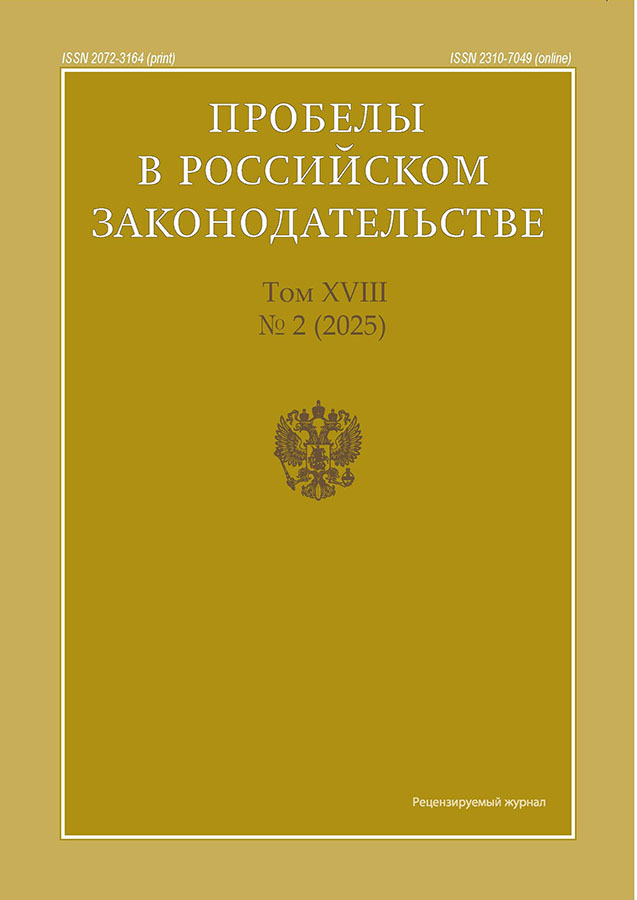Improving Access to Justice in Cassation Proceedings through the Use of Artificial Intelligence
- Authors: Shatalov N.N.1,2
-
Affiliations:
- Lebedev Russian State University of Justice
- The Fourth Court of Cassation of General Jurisdiction
- Issue: Vol 18, No 2 (2025)
- Pages: 103-110
- Section: Criminal Law Sciences
- URL: https://journals.eco-vector.com/2072-3164/article/view/678701
- EDN: https://elibrary.ru/LJWBHX
- ID: 678701
Cite item
Abstract
The article provides a systematic analysis of the possibilities and prospects of using artificial intelligence technologies as an auxiliary tool for improving access to justice in criminal cassation proceedings. Based on the study of modern scientific approaches and law enforcement practice, the author specifies key areas of artificial intelligence application: automated analysis of cassation complaints and submissions, implementation of "predictive cassation", integration of computer vision technologies, ensuring uniformity of judicial practice. The necessity of maintaining the auxiliary nature of artificial intelligence systems in relation to the procedural activities of the court while simultaneously increasing the guarantees of legality and validity of cassation instance decisions is substantiated. Potential risks of artificial intelligence implementation are identified and specific mechanisms for their minimization are proposed.
Full Text
About the authors
Nikolay N. Shatalov
Lebedev Russian State University of Justice; The Fourth Court of Cassation of General Jurisdiction
Author for correspondence.
Email: rgyp.shatalov@mail.ru
SPIN-code: 5435-4418
Criminal Procedure Law named after N.V. Radutnaya, Federal Judge
Russian Federation, Moscow; KrasnodarReferences
- Bormotova L. V. Artificial intelligence in criminal proceedings. Digital technologies and law: collection of scientific tr. II International Scientific Journal.-Practical conference (Kazan, September 22, 2023). Ed. by I. R. Begishev, E. A. Gromova, M. V. Zaloilo, I. A. Filipova, A. A. Shutova. In 6 vols. Vol. 2. Kazan: Publishing house "Cognition" of Kazan Innovation University, 2023. Pp. 51–58. EDN: ISYAEE. doi: 10.21202/978-5-8399-0817-8_4_340.
- Buglaeva E. A. Prospects for the use of artificial intelligence technologies in the field of judicial proceedings. Bulletin of SUSU. The Pravo series. 2024. Vol. 24. No. 1. Pp. 10–15. EDN: TPNEGN. doi: 10.14529/law240102. (in Rus.).
- Gladysheva O.V., Sementsov V. A., Loshkobanova Ya. V. Artificial intelligence and digital (electronic) evidence in criminal proceedings. Law Bulletin of Kuban State University. 2024. No. 1. Pp. 89–99. EDN: GCBHDE. doi: 10.31429/20785836-16-1-89-99. (in Rus.).
- Zaplatina T. S. Artificial intelligence in the issue of judicial decisions, or an AI judge. Bulletin of the O. E. Kutafin University (MGUA). 2019. No. 4 (56). Pp. 160–168. EDN: UTETID. doi: 10.17803/2311-5998.2019.56.4.160-168. (in Rus.).
- Kostenko R.V., Ilyashenko A. N. The future of criminal justice: the role of artificial intelligence in predictive analytics. Bulletin of the St. Petersburg University of the Ministry of Internal Affairs of Russia. 2024. No. 3 (103). Pp. 200–206. doi: 10.35750/2071-8284-2024-3-200-206. (in Rus.).
- Kostenko R.V., Ilyashenko A. N. Justice programming: the possibilities of artificial intelligence in sentencing. Jurist-Pravoved. 2024. No 2 (109). Pp. 124–131. EDN: HJFKMT. (in Rus.).
- Kostenko R. V. Artificial intelligence in investigative activities. Theory and practice of crime investigation: materials of the XII International Scientific-practical conference, Krasnodar, May 23, 2024. Krasnodar: Krasnodar University of the Ministry of Internal Affairs of the Russian Federation, 2024. Pp. 351–355.
- Kostenko R. V. Artificial intelligence as a judge in criminal proceedings. Actual problems of judicial, law enforcement, human rights, criminal procedure and anti-corruption activities: materials of International Scientific-practical conference, Krasnodar, April 05, 2024. Krasnodar: Kuban State University, 2024. Pp. 238–245. EDN: DLKYUI.
- Kostenko R. V. Trends and prospects of using modern technologies in pre-trial proceedings in the system of Russian criminal procedure. Criminal procedural activity in pre-trial proceedings: Monograph. Krasnodar: Kuban State University, 2023. Pp. 69–80. EDN: LTZZXR.
- Laptev V. A. Artificial intelligence in court (judicial AI): legal foundations and prospects of its work. Russian Justice. 2021. No. 7. Pp. 10–13. EDN: HEWMDY. doi: 10.52433/01316761_2021_7_2. (in Rus.).
- Litvin I. I. On the issue of the legal personality of artificial intelligence in criminal proceedings. Advances in Law Studies. 2022. Vol. 10. No. 2. Pp. 26–30. EDN: IWEDCI. doi: 10.29039/2409-5087-2022-10-2-26-30. (in Rus.).
- Malina M. A. The use of artificial intelligence in the administration of justice in criminal cases: problems and prospects. State and law. 2022. No. 1. Pp. 91–97. EDN: VDPSAS. doi: 10.31857/S102694520018277-5. (in Rus.).
- Ryabtseva E. V. The problem of using artificial intelligence in criminal justice. All-Russian Journal of Criminology. 2023. Vol. 17. No. 1. Pp. 73–80. EDN: GTQMIU. doi: 10.17150/2500-1442.2023.17(1).73-80. (in Rus.).
- Sementsov V. A. Artificial intelligence in investigative actions. Trends in Russia's criminal policy at the present stage of society's development: collection of articles of the All-Russian Scientific Journal.-practical conference dedicated to the 25th anniversary of the Departments of Criminal Law and Criminology, Criminal Procedure and Law Enforcement, Izhevsk, March 14–15, 2024. Izhevsk: Udmurt State University, 2024. Pp. 67–77. EDN: NHZVXC.
- Fedorovich V.Yu., Khimicheva O. V., Andreev A. V. The introduction of computerization and artificial intelligence technologies as promising areas for the development of modern criminal justice. Bulletin of the Moscow University of the Ministry of Internal Affairs of Russia. 2021. No. 2. Pp. 205–210. doi: 10.24412/2073-0454-2021-2-205-210. (in Rus.).
- Churikova A. Y. Artificial intelligence in criminal proceedings: opportunities and risks of use. Information Law. 2023. No. 4 (78). Pp. 22–25. EDN: JOBZSW. doi: 10.55291/1999-480X-2023-4-22-25. (in Rus.).
- Churikova A. Y. The use of artificial intelligence for risk management of criminal procedural activities of law enforcement agencies. Technologies of the XXI century in jurisprudence: materials of the Fifth International Scientific Conference.-practical conference, Yekaterinburg, May 19, 2023. Yekaterinburg: ANO "Center for the Promotion of Criminalistics "KrimLib", 2023. Pp. 250–256. EDN: MLJYDD.
Supplementary files









